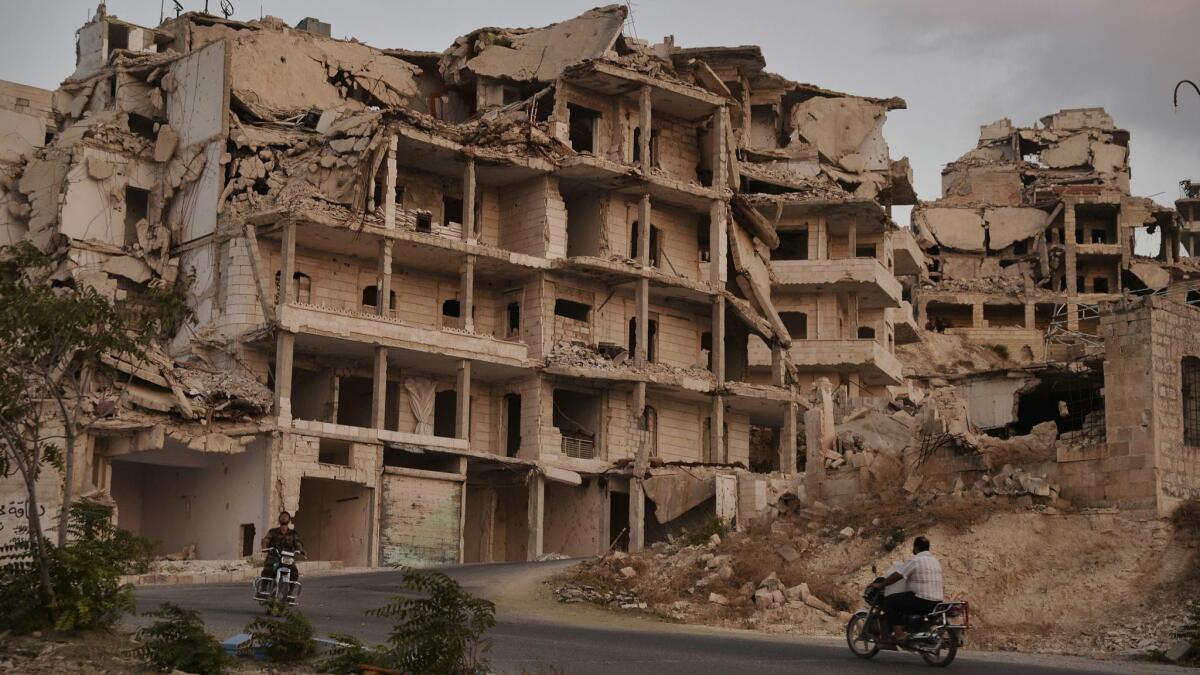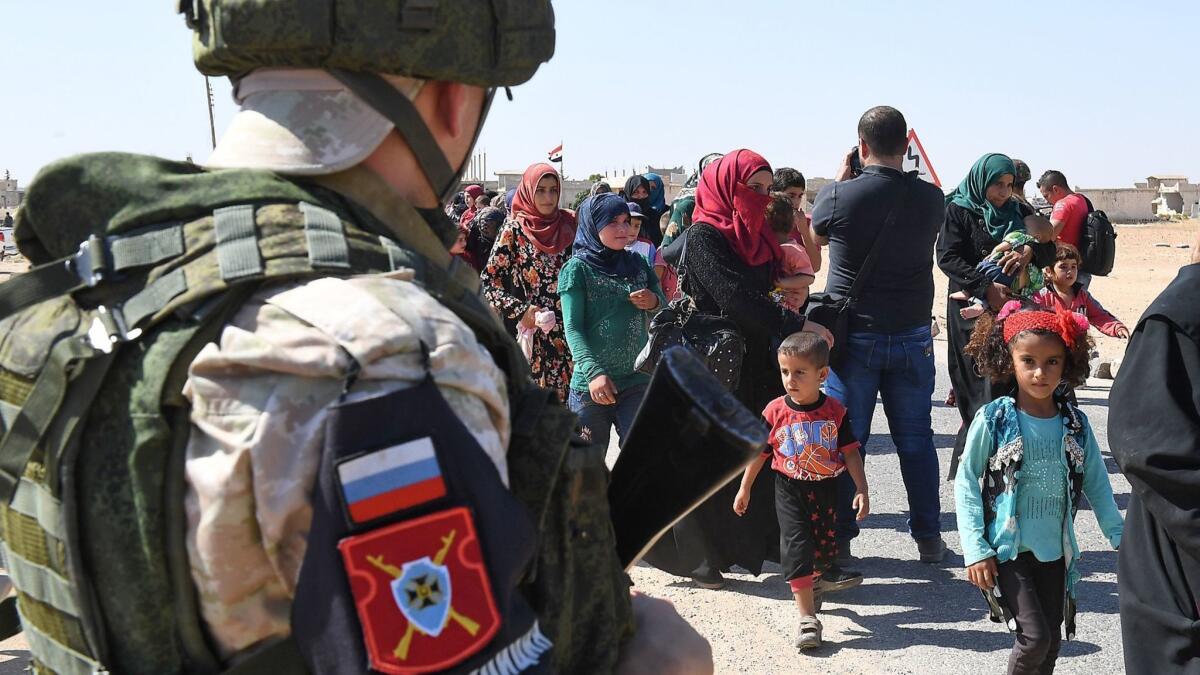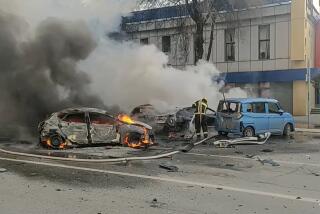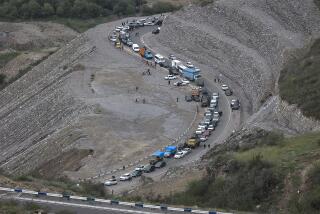Turkey and Russia work to avert a bloodbath in Syria’s last major rebel bastion

The best hope for averting a bloodbath in the northwest Syrian province of Idlib — home to 2.6 million people and the last major bastion of rebels fighting the government — depends on cajoling tens of thousands of militants there to lay down their weapons.
That job falls to neighboring Turkey, which in an eleventh-hour deal last month brokered with Russia put on hold a Syrian government offensive to take back the province and end the long insurgency.
Under the agreement, all rebels must surrender their rocket launchers, tanks and other heavy weapons by Oct. 10 to create a demilitarized zone.
The dominant rebel group, the Organization for the Liberation of Syria, which controls about 70% of the province and was once affiliated with Al Qaeda, would then have five days to withdraw from the zone along with other jihadi groups.
That would leave the zone under the control of a more moderate alliance known as National Liberation Front, which is backed by Turkey.
But all that may be wishful thinking. Both major rebel groups have indicated that they are unwilling to give up their weapons.
There will be “no handover of arms,” Naji Mustafa, a spokesman for the National Liberation Front, said Monday by phone.
“In any case our heavy weaponry is already in the rear lines,” he said.
There were also conflicting understandings over how the deal would be enforced. The agreement calls for Turkish soldiers and Russian military police to patrol the zone together while allowing the rebels to keep anti-aircraft guns, medium machine guns and anti-armor rockets.
But Mustafa said that only forces from Turkey — and not Russia, which has provided critical military support to the Syrian government — would be allowed to patrol the buffer zone. The government would also be barred, he said.
That runs counter to the frequently stated ambition of Syrian government officials to “retake every inch of the country.”
Walid Moallem, the foreign minister, said in an interview last week with the Moscow-funded Russia Today broadcaster that the deal “was a positive step for the Syrian state to spread its control over all of its territories.”
He said reconciliation agreements would ensure a “peaceful solution” in Idlib, though rebels and human rights groups point out that waves of arrests have followed similar deals in other parts of the country.
Idlib, a mountainous region renowned for its olives and cherries, lies at the nexus of major highways that form the backbone of Syria’s transit system.
Its proximity to Turkey made it a primary conduit for rebel factions after the Syrian civil war began in 2011. With support from the Turkish government, the opposition ferried men and supplies across the border to fight loyalist forces.
In 2015, an alliance of Islamist and secular groups drove government troops from the entire province and announced that Idlib would be the springboard for the opposition to topple Syrian President Bashar Assad and take over the country.
But Russia’s entry into the war turned the tide in Assad’s favor, and as the rebels ceded one enclave after another to government campaigns, Idlib became the dumping ground for militants unwilling to lay down their arms and civilians who don’t want to live under Assad’s government.
Many of its residents are packed in overcrowded camps, relying on humanitarian aid from a host of countries arrayed against Assad.
The Organization for the Liberation of Syria is thought to have as many as 15,000 militants in the province.
The National Liberation Front — a mix of hard-line Islamic groups and more moderate Western-backed rebel factions — was formed this year at the urging of Turkey, which wanted a check on the power of the more radical opposition.
Islamic State also has a small presence in Idlib, along with thousands of Chinese, Albanian and other foreign jihadis.
For weeks, Syrian army troops have massed around Idlib. But Western powers, have urged Russia and the Syrian government not to engage in what President Trump called a “reckless escalation” in Idlib.
“If it’s a slaughter,” he later said in reference to a government campaign, then the U.S. and the world are “going to get very, very angry.”
James Jeffrey, the U.S. special representative to Syria, said at a news briefing last week that the U.S. would be especially likely to intervene militarily if the Syrian government used chemical weapons, as Assad stands accused of having done in the past.

The agreement to put the offensive on hold was forged Sept. 17 in the Russian resort city of Sochi between Russian President Vladimir Putin and Turkey’s Recep Tayyip Erdogan.
The deal would reopen the vital M5 highway, which links the Syrian capital, Damascus, to the northern city of Aleppo, and the M4, which connects the coastal city of Latakia to Syria’s east.
It would also restart shipping commerce on the Turkish-Syrian border through the Bab al Hawa crossing, which has long been controlled by the Organization for the Liberation of Syria, which has collected millions of dollars in taxes there.
The return of Idlib to the Syrian government would also have benefits for Russia, bringing it closer to ending its involvement in a conflict that has already killed 112 of its servicemen and hundreds of affiliated private mercenaries.
Russia also hopes a peaceful resolution in Idlib will result in billions of dollars in aid from Western donors for reconstruction that could be a windfall for Russian companies.
But among foreign powers involved in Idlib, Turkey may have the most at stake.
Seeking to prevent a massive influx of refugees and fearing the security risk of jihadis who could join the deluge, Turkey has sealed its border and intensified efforts to persuade the rebels to disarm.
Local media have reported intense discussions between the Turkish intelligence service and the Organization for the Liberation of Syria.
“What is worrying is that it would seem Turkey would have to offer extremist groups something to leave the demilitarized zone, potentially some kind of material incentives,” said a Western official.
He said that other groups were trying to absorb those rebels so they “can stay in their hometowns within the demilitarized zone.”
Twitter: @nabihbulos
More to Read
Start your day right
Sign up for Essential California for news, features and recommendations from the L.A. Times and beyond in your inbox six days a week.
You may occasionally receive promotional content from the Los Angeles Times.







